The coverage on this live blog has ended — but for up-to-the-minute coverage on the coronavirus, visit the live blog from CNBC's Asia-Pacific team.
- Global cases: More than 2,151,100
- Global deaths: At least 142,735
- US cases: More than 667,200
- US deaths: At least 32,868
The data above was compiled by Johns Hopkins University.
8:40 pm: San Francisco launches discounted transit program for elderly and disabled
The city of San Francisco will discount public city taxi rides for elderly and disabled people as those populations are hit hardest by the Covid-19 pandemic. The Essential Trip Card (ETC) will be a discount program that uses taxis to take people on essential trips like going to the grocery store, pharmacy or another necessary medical trip during the shelter-in-place period. Eligible participants will pay 20% of the cost of a regular cab ride fare for essential trips. —Jennifer Elias
8:15 pm: Chubb CEO: Forcing insurers to pay pandemic loss claims is 'plainly unconstitutional'
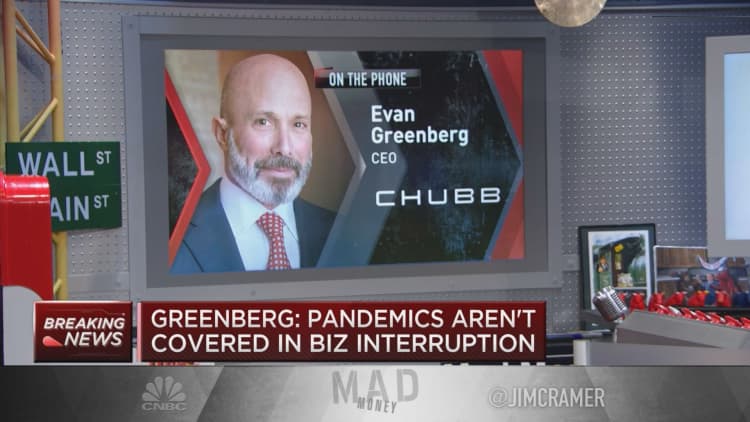
State lawmakers have made efforts to extend business interruption coverage to coronavirus-related insurance claims, but the head of a leading commercial real estate insurer is objecting to those moves.
Chubb CEO Evan Greenberg, in an interview on CNBC Thursday, said state governments can't force insurance companies to cover incidents not included in the policy, leaning on the U.S. Constitution for support.
"You can't just retroactively change a contract. That is plainly unconstitutional," he told "Mad Money" host Jim Cramer, who acknowledged that he is a Chubb client. "The industry would prevail on that and so I understand the frustration of legislators, I understand they're looking for a remedy, but this would be a self-inflicted injury and create great uncertainty at a time when we have enough uncertainty and we're trying to heal the economy." —Tyler Clifford
7:50 pm: White House officials say community surveillance is 'critical'
Surveillance tools for people who show no signs of Covid-19 is now considered "critical" to stopping the spread of the virus, members of the Coronavirus Task Force said in a briefing Thursday. It represents an update — a new "focus"— in what officials believe is now necessary to contain the coronavirus, Anthony Fauci said.
"Now, you can start figuring out what the penetrance is in society," Fauci said. "That's going to inform us greatly in a number of things. It's gonna give us information of what the vulnerable areas are and how we need to respond."
It's an "invisible war," Trump said about the virus, adding that it's resulted in five time more deaths from civil war. "This is a military operation with a lot of help from corporation." —Jennifer Elias
7:30 pm: US Navy hospital ship will see patients from Philadelphia area
The Pentagon announced Thursday that it will begin to receive patients from the greater Philadelphia area on the USNS Comfort hospital ship amid the coronavirus pandemic.
"In anticipation of medical support needed in the greater Philadelphia area, the USNS Comfort is prepared to admit patients within a one-hour traveling radius from the ship," according to a statement by Northern Command, the Pentagon's lead for Covid-19 operations in the United States.
The Pentagon deployed the USNS Comfort and the USNS Mercy hospital ships in March to help with the surging coronavirus cases. —Amanda Macias
7:12 pm: Khan Academy founder: Balance between in-person, online learning could be 'silver lining' of crisis
The forced closure of schools around the world due to the coronavirus pandemic could create a better balance between online and in-person learning going forward, Khan Academy founder Salman Khan said.
"What I think might change is that people are going to realize that you can lean on these types of online tools," Khan said on "Closing Bell."
"Even when we didn't have school closures, their value was if I'm a teacher in a class with 30 students, how do I cater to their individual needs? ... So I'm hoping that as we come out of this the silver lining will be we will understand how to leverage both in the best possible ways," Khan continued. "How to blend them, if you will." —Jesse Pound
6:58 pm: Dr. Deborah Birx outlines the White House's plan to reopen the US economy

6:49 pm: Microsoft stock is up because businesses want secure video conferencing, says Robert Herjavec
Cybersecurity entrepreneur Robert Herjavec said Thursday that Microsoft's stock has been lifted by businesses who want secure video conferencing during the coronavirus pandemic.
"The use of Teams at the corporate enterprise level is really taking off," the "Shark Tank" investor said on CNBC's "Squawk Alley."
"I think that's one of the reasons Microsoft's stock is doing so well." —Kevin Stankiewicz
6:31 pm: Uber shares pop after the company scraps guidance and forecasts investment writedown
Uber shares rose as much as 7% in extended trading after the company said that it was withdrawing guidance given during its Q4 earnings call and warned that it expects an impairment charge because of declines in investments.
The company's ride-sharing and delivery businesses have been affected by the coronavirus pandemic and lockdowns, but Uber has given little guidance on the expected effects. CEO Dara Khosrowshahi said on a call with analysts March 19 that booking declines in Seattle had reached 60% to 70% on an annualized basis.
Investors may be cheered by the relatively small effect of programs that Uber rolled out to help drivers during the pandemic. The company said it expects that program to reduce GAAP net income by an estimated $17 to $22 million in Q1 and an estimated $60 to $80 million in Q2. —Jordan Novet
6:22 pm: Dow futures rip 700 points higher amid report Gilead drug showing effectiveness treating coronavirus
U.S. stock futures surged on Thursday night after a report said a Gilead Sciences drug was showing effectiveness in treating the coronavirus. The move pointed to a jump for the stock market on Friday.
Dow Jones Industrial Average futures were up 700 points, or about 3%. S&P 500 futures gained 2.8% while Nasdaq 100 futures were up by 1.8%. —Fred Imbert
5:30 pm: Boeing set to resume commercial plane production as early as April 20
Boeing is planning to resume commercial aircraft production at its Seattle-area factories as early as April 20 with new physical-distancing measures aimed at preventing the spread of Covid-19.
The company had suspended production at those factories three weeks ago amid stay-at-home orders in Washington state. It later said it would temporarily shut down production at its South Carolina factory where it makes wide-body 787 jetliners, a move that effectively suspended Boeing's commercial aircraft assembly.
Boeing's CEO Dave Calhoun, in a note to staff, cheered the progress airlines made toward getting billions in government aid to help soften the blow from the coronavirus, which has sent U.S. air travel demand down 95% from a year ago. —Leslie Josephs
5:24 pm: The tech industry's early work-from-home mandates helped California and Washington flatten the curve
On March 19, California Gov. Gavin Newsom announced a statewide shelter-in-place order to stem the spread of the Covid-19 coronavirus. Washington State Gov. Jay Inslee followed four days later.
While they were moving aggressively relative to the rest of the country, the top employers in their states were weeks ahead of them.
Twitter was the first to move, strongly encouraging its nearly 5,000 employees to work from home on March 1, because of the rapidly spreading coronavirus, and making the order mandatory on March 11. Amazon told its roughly 50,000 Seattle-area employees on March 4 to work from home if they could. Facebook informed its Bay Area workers the next day that it was "strongly recommending" they work remotely. Over the next week, Google, Microsoft and Salesforce mostly emptied out, keeping about 200,000 people away from the office.
Tech has taken a beating in recent years as critics have attacked the industry's growing power, privacy abuses and executive malfeasance. But the industry's early social-distancing moves are a big reason that California and Washington, two early U.S. hotspots of virus outbreak, have bent the infection curve while other states are deep in crisis. —Ari Levy
5:18 pm: S&P 500 ETF jumps 2% after hours on report Gilead drug showing effectiveness as treatment
The ETF that tracks the S&P 500 rallied in after-hours trading after a report said a Gilead Sciences drug was showing effectiveness in treating the coronavirus. The move pointed to a jump for the stock market on Friday.
Around 5 p.m. ET, the SPDR S&P 500 ETF Trust (SPY) was up 2%. Stock futures open at 6 p.m. ET.
Gilead shares jumped by 9% after STAT news reported that a Chicago hospital treating coronavirus patients with Remdesivir in a trial were recovering rapidly from severe symptoms. The publication cited a video it obtained where the trial results were discussed.
Stocks tumbled from record highs in February into a bear market a month later as the spread of the coronavirus roiled market sentiment and the economic outlook. —Fred Imbert
5:14 pm: Gilead stock surges after report says drug trial shows encouraging early results
Gilead Sciences shares surged by more than 10% in after-hours trading after an industry publication said Covid-19 patients being treated with the company's antiviral drug Remdesivir appear to have "rapid recoveries in fever and respiratory symptoms."
STAT News said a doctor running a Chicago-based hospital conducting a closely watched trial on the drug found that most of its patients had been discharged in less than a week.
There are no proven therapies to treat Covid-19, which has infected more than 2 million worldwide as of Thursday night, according to data compiled by Johns Hopkins University.
Some health authorities in the U.S. and China have been using Remdesivir, which was tested as a possible treatment for the Ebola outbreak, in hopes that the drug can reduce the duration of the virus in patients. —Berkeley Lovelace Jr.
5:04 pm: Reported cases across the globe
4:58 pm: Trump to roll out guidelines to open up parts of US where cases decline and testing ramps up
President Donald Trump is set to unveil broad new federal guidelines that lay out conditions for parts of the U.S. to start relaxing some of the strict social distancing measures imposed to combat the spread of the coronavirus pandemic.
The new guidance will identify the necessary circumstances for areas of the country to allow employees to start returning to work – but the decision will ultimately be made by state governors, two sources told CNBC.
States, which have imposed their own containment measures to try to slow the spread of the disease, are not legally required to follow the White House's instructions. But the new guidance nevertheless ramps up pressure on governors to loosen their restrictions, even as health experts and business leaders alike warn that widespread testing systems are needed before Americans can safely start returning to their normal lives.
"You're going to call your own shots," Trump said on a call with dozens governors Thursday afternoon, NBC News reported, citing two people listening on the call.
Despite the president saying earlier this week that he believed some states may be able to "reopen" their economies before May, the White House guidelines do not offer any specific dates, a White House official told NBC. —Kayla Tausche, Kevin Breuninger
4:46 pm: Fed's Harker says lost jobs will come back, but US should be patient
Philadelphia Federal Reserve President Patrick Harker expressed optimism Thursday that many of the 22 million jobs lost so far during the coronavirus lockdown will come back, though he said the nation shouldn't rush.
Instead, he counseled a slow return to normalcy, with parts of the economy that can practice social distancing to reopen first and others to come back online as medical advances make it possible.
"We're going to hit a period where it's going to be pretty bad. It's pretty bad right now," Harkin said during an interview on CNBC's "Closing Bell." "We will climb out of this. It's not going to be a sudden bounceback. I mean, it just doesn't make sense to me. There's going to be certain industries like travel and tourism and hospitality and so forth that will take some time to recovery."
One industry he cited specifically was construction. Pennsylvania's construction employment was at 266,000 in February and had been showing the state's biggest growth among all occupations prior to the coronavirus construction.
Since then, the U.S. has record-breaking numbers of workers head to the unemployment line, with 5.2 million more filing over the past week. —Jeff Cox
4:36 pm: Pandemic clobbers workers in 2020 swing states Michigan and Pennsylvania
The coronavirus pandemic has ravaged workers in Michigan and Pennsylvania, two of the states President Donald Trump most needs to win to earn another term in the White House.
More than 22 million Americans applied for unemployment insurance over the latest four weeks as the outbreak forced businesses to close, according to Labor Department data released Thursday. The two 2020 election battlegrounds took a bigger hit than nearly all other states.
Michigan, with just above 1 million initial jobless claims during the period, saw the second highest number per capita. Pennsylvania had 1.3 million unemployment insurance claims overall, the fourth-most per 10,000 residents.
Generally, states that supported Democrat Hillary Clinton in 2016 saw more jobless claims than those that backed Trump. Michigan and Pennsylvania, which helped to send Trump to the White House by voting for him by razor thin margins, stand out from the bunch. —Jacob Pramuk, John Schoen
4:21 pm: Gov. Newsom offers two weeks of paid sick leave to California food workers
California Gov. Gavin Newsom signed a statewide executive order giving two weeks of supplemental paid sick leave for those working in the food sector.
"That sector by definition is essential to our livelihood and our capacity to meet just basic needs in this pandemic," Newsom said at a press briefing Thursday.
The paid sick leave will be available to to workers who have contracted Covid-19, been exposed to it or have been affected by isolation or quarantine orders from local, state or federal health officials.
"We don't want you going to work if you're sick," Newsom said.
The measure impacts frontline food workers such as those who grow, pick, pack, deliver, cook and sell food, according to Newsom. He said he hopes the paid sick leave will "significantly address" some of the anxiety these workers have during the pandemic —Hannah Miller
4:10 pm: New Jersey opens probe of nursing home deaths after finding 17 bodies in facility
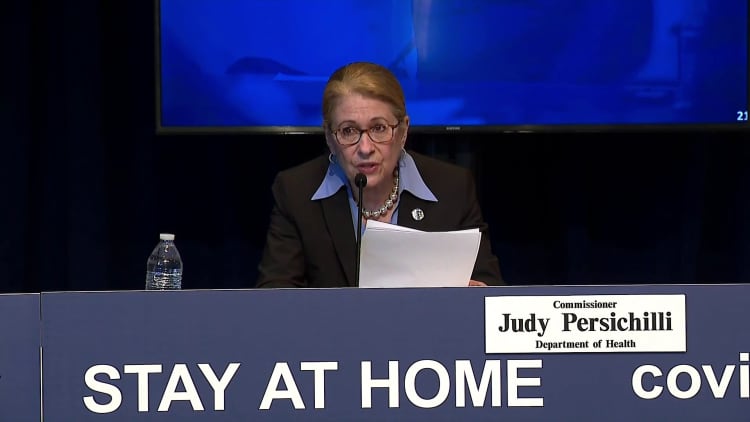
New Jersey has opened an investigation into nursing home deaths across the state after officials discovered 17 bodies piled into a makeshift morgue and more than 100 residents infected with Covid-19 at a long-term care facility, state officials said Thursday.
Gov. Phil Murphy said he was "outraged" that staff at the Andover Subacute and Rehabilitation Center in Northern New Jersey piled deceased residents into a small room at the facility.
"A story like this shakes you to the bone," Gov. Phil Murphy said at a press conference. "New Jerseans living in our long-term care facilities deserve to be cared for with respect, compassion and dignity. We can and must do better."
State and local officials inspected the facility at about 2 a.m. on Sunday after receiving a call that it needed body bags and was storing 28 dead bodies, New Jersey Health Commissioner Judy Persichilli told reporters. There were just five bodies on the premises; three more were released to local mortuaries earlier, she said. They received another complaint on Tuesday, she said.
Officials have since discovered that 103 residents have tested positive for the coronavirus and 133 more have flu-like symptoms between the facility's two buildings, she said. At least 35 residents have died since March 30; 19 of those have been attributed to Covid-19, she said. At least 52 employees have reported flu-like symptoms. —Noah Higgins-Dunn, William Feuer, Dawn Kopecki
4:00 pm: For essential retail workers, the need for mental health care may outlast pandemic
For grocery store and pharmacy workers across the U.S., stocking shelves and checking out customers have become anxiety-inducing tasks. Each commute and customer interaction comes with the risk of exposure to the coronavirus. And returning home means a chance of transmitting a potentially deadly illness to a spouse or family member.
Thousands of grocery and retail workers have gotten sick from Covid-19. Some have died.
Major retailers, psychologists and the nation's top grocery worker union say they anticipate a greater need for mental health services, such as therapy, as people continue to work during the pandemic and later cope with its aftermath. Anxiety, depression and other mental health challenges may linger, even as coronavirus cases level out or decline — especially for those on the front lines.
Some retailers, such as Walgreens and Walmart, say they're encouraging workers to use company-provided benefits, such as tele-therapy and referring them to digital tools that offer stress relief strategies, mediation exercises and peer support. —Melissa Repko
3:47 pm: 'A long way to go' before there's enough testing to reopen economy, Business Roundtable CEO says

The United States needs to see increased testing for the coronavirus before businesses can begin to reopen, Business Roundtable President and CEO Joshua Bolten said Thursday.
"We've clearly got a long way to go, but there's progress being made every day ... all the CEOs in our organization agree that testing is an absolutely crucial gating element to getting us back and running safely," Bolten said on CNBC's "Power Lunch." "So everything we can do to expand the availability of fast and accurate testing is going to be probably the most crucial element to reopening promptly and safely."
The lack of testing for the virus has been one of the main issues facing the U.S. during the pandemic, with many places limiting who could be tested as the virus spread across the country. The Centers for Disease Control and Prevention said tests it sent out early on were found to be defective.
Bolten said returning to a more normal economic environment should involve a "phased" plan in which some businesses open before others and that policymakers should be working on those arrangements now.
"It's not too soon to plan for a safe and rapid reopening. In fact, it's very important that the planning go on now," Bolten said. —Jesse Pound
3:22 pm: The economy can't reopen without widespread testing — getting there will take a lot of work and money
As the United States reels from the massive economic fallout of the coronavirus outbreak, there are growing calls by President Donald Trump and others to start to reopen businesses, schools and other public spaces so that the nation can begin to recover financially.
But health experts and several top business leaders warn that the country should not reopen on a broad scale unless there is a huge increase in the relatively small number of tests currently being done for Covid-19 infection. Health experts also say the country needs a related and equally robust program to trace the people who have had contact with infected people, to avoid seeing those contacts themselves spread the coronavirus to others.
There are only about 120,000 samples or so being tested each day for the coronavirus in the United States, according to the federal Centers for Disease Control and Prevention.
Experts say that millions of people will have to be tested each day, even as many as 20 million to 30 million people, before the nation can return to a semblance of economic normality. —Dan Mangan
3:04 pm: NY Gov. Andrew Cuomo on how the state will prioritize the reopening of businesses
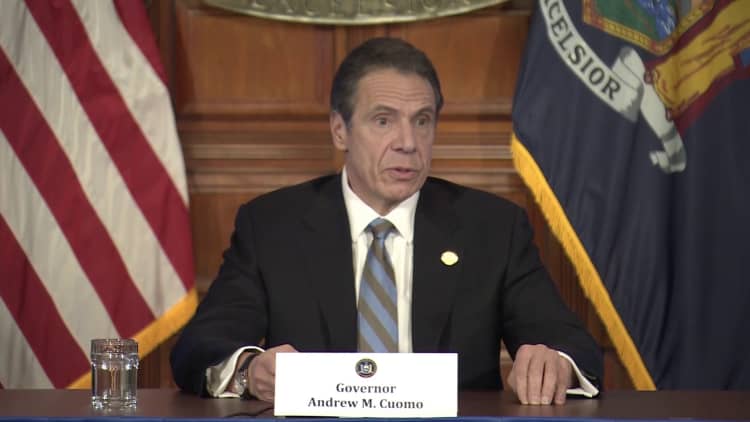
2:51 pm: GE, Ford sign $336 million federal contract to make ventilators
General Electric and Ford Motor will produce 50,000 ventilators for the U.S. government under the Defense Production Act for $336 million, federal officials announced.
Production of the ventilators is expected to begin next week at a Ford facility in Michigan. The companies are expected to produce all the ventilators by July 13, according to the Department of Health and Human Services.
According to the terms in the announcement, each ventilator would cost $6,720. That's nearly $10,000 below a previous federal contract for 30,000 ventilators at $489.4 million, or about $16,300 per unit, with General Motors and Washington-based Ventec Life Systems. —Michael Wayland
2:37 pm: Starz app sees 142% spike in new subscribers
Premium TV subscription Starz has seen a spike in viewership and new sign-ups in the wake of social distancing restrictions in the U.S., Starz CEO Jeff Hirsch said on CNBC's "The Exchange."
The premium cable channel, which also has a digital app, is home to critically acclaimed shows like "Outlander" as well as hot films like "Once Upon a Time in Hollywood."
The Starz app has seen a 44% jump in average viewership since people have been forced to stay home due to the outbreak. The app, which usually costs $9 a month, is currently discounted to $5 a month for three months. It has seen a 142% increase in new customers since the stay-at-home orders began. —Sarah Whitten
2:20 pm: Apple Store to reopen in South Korea with an emphasis on fixing Macs and iPhones
An Apple store in Seoul will reopen on Saturday, an Apple representative confirmed. It's the first Apple retail store outside of China to reopen and Apple's only store in South Korea.
The store will have limited hours and will focus on fixing existing customers' iPhones and computers.
"To start, we'll have an adjusted schedule and guidelines to ensure customers and employees continue to stay healthy. A focus for the store will be service and support at the Genius Bar. For customers who want to make a purchase, we have several options including ordering online for delivery or pick up in store," Apple said in a statement. —Kif Leswing
2:18 pm: Seven governors in Midwest to work together to reopen their economies
Governors in seven U.S. Midwest states said they will work in close coordination to reopen the economy in their regions.
The governors for Michigan, Ohio, Wisconsin, Minnesota, Illinois, Indiana and Kentucky have formed a partnership to work together on restarting the economies in their states, they said in a statement.
"We are eager to work together to mitigate the economic crisis this virus has caused in our region," the governors said in a joint statement. "We recognize that our economies are all reliant on each other, and we must work together to safely reopen them." —Reuters
2:02 pm: New York hospitalizations continue to decline
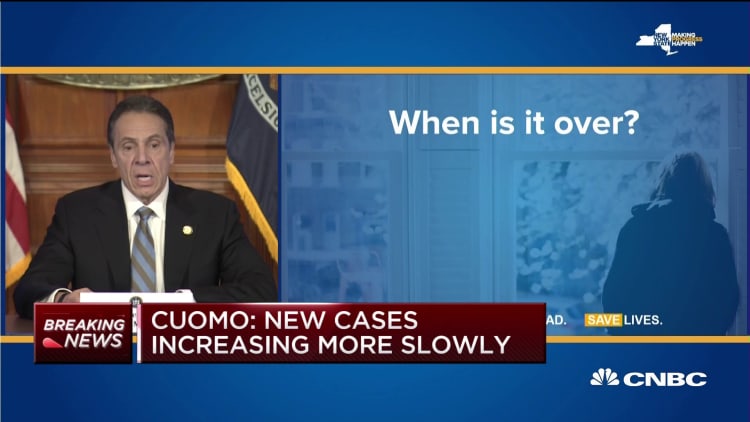
1:58 pm: Facebook canceling large events through June 2021
Facebook CEO Mark Zuckerberg announced the company will allow its employees to work from home through the summer and it will not host any large events until at least July 2021.
"Most Facebook employees are fortunate to be able to work productively from home, so we feel a responsibility to allow people who don't have this flexibility to access shared public resources first," Zuckerberg wrote in a post on Facebook. "I hope this helps contain the spread of Covid-19 so we can keep our communities safe and get back up and running again soon."
Facebook employees will be required to work from home until at least the end of May, but the company will allow employees who for any reason feel that they cannot return then to continue working from home "through at least the summer." Additionally, the company said it will not host any physical events consisting of 50 or more people through June 2021. The company will instead host gatherings of that size as virtual events. —Salvador Rodriguez
1:55 pm: Cramer: Amazon is the 'Grim Reaper' for smaller businesses, but it also may help save America
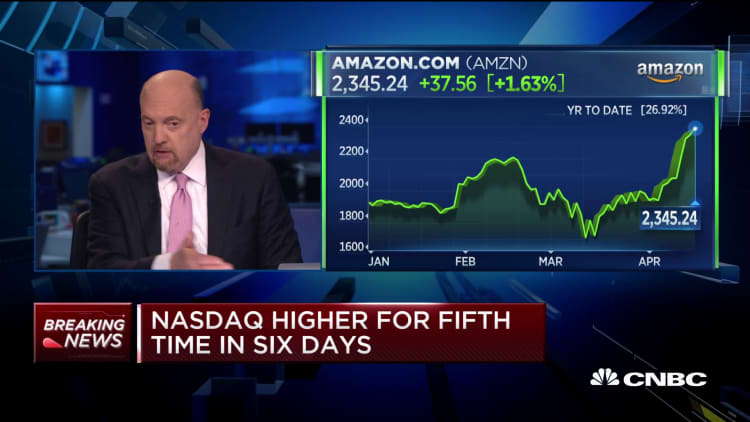
Amazon's dominance has been solidified during the coronavirus pandemic, but the consequences of that are complicated, CNBC's Jim Cramer said.
"Amazon is either the Grim Reaper for everyone or the greatest thing that's ever happened to the American consumer. Or maybe both," Cramer said on "Squawk on the Street."
"Has Amazon not become a country during this period?" Cramer added, noting Amazon's dramatic hiring to keep pace with coronavirus-related demand increases while the rest of the U.S. economy has shed 22 million jobs in recent weeks.
Since March, the e-commerce giant has added more than 100,000 new employees, with plans to add another 75,000 to its ranks.
"They're a juggernaut that just wipes out everybody," said Cramer, pointing to Amazon's far-reaching operations into a myriad of sectors. "Look what they're doing to the drug stores." —Kevin Stankiewicz
1:49 pm: Italy's fashion leaders urge Rome to lift restrictions on industry
Italy's fashion leaders called on the government to loosen restrictions imposed in response to the coronavirus crisis to allow them to resume some production, warning that a prolonged lockdown risked irreparably damaging the sector.
"Fashion is a seasonal industry, and certain dates are not compressible. Not reopening shortly would mean giving up almost a year's turnover," said Carlo Capasa, the chairman of Italy's National Fashion Chamber (CNMI), in an online interview on the website of daily Corriere della Sera.
Current lockdown measures in Italy - the country with the third highest number of confirmed cases after the United States and Spain - have been imposed until May 3.
With a turnover of 95 billion euros ($98 billion US) and 600,000 workers, Italy's fashion and textile industry is the second most important nationwide.
It accounts for a 41% share of the sector in Europe, followed by Germany, which represents 11% of the total. —Reuters
1:41 pm: The New York retail real estate market is reeling because of coronavirus, as rents tumble
The coronavirus pandemic is pummeling the retail real estate market in New York City, with rents tumbling and not expected to turn around anytime soon, according to a new report from commercial real estate services firm CBRE.
Average retail asking rents in the city continued to fall during the first quarter, which started Jan. 1 and ended March 31, with the average of the New York City neighborhoods surveyed dropping 9% year over year to $714 per square foot, the report said. This marked the tenth consecutive quarter of declines. On a year-over-year basis, 13 of the 16 corridors tracked by CBRE, including the Upper East Side and Upper West Side, saw rent decreases.
Most notably, in Times Square, retail rents have dropped to levels not seen since 2011. Average rents dropped 15.7% from a year ago to $1,647 per square foot. Average rents are now below $1,800 per square foot for the first time since 2011, CBRE said. —Lauren Thomas
1:33 pm: US intel community examining whether virus emerged accidentally from a Chinese lab
The U.S. intelligence community is examining whether the virus that caused a global pandemic emerged accidentally from a Chinese research lab studying diseases in bats, current and former U.S. intelligence officials tell NBC News.
Spy agencies have ruled out that the novel coronavirus was manmade, the officials say. But scientists at a military and a civilian lab in Wuhan, where the virus originated, are known to have conducted ongoing research on coronaviruses, officials say. They say intelligence agencies have gathered and are weighing evidence that an employee of one of the labs could have become accidentally infected and left the facility with the virus.
"It's a possibility, though not the most likely possibility," one official told NBC News.
Asked about the intelligence on TODAY, Secretary of Defense Mark Esper said, "This is something we've been watching closely now for some time," adding that the results of the investigation are thus far "inconclusive." —Ken Dilanian, Courtney Kube
1:25 pm: Lawyers get ready for first-ever Supreme Court oral arguments by phone
The Supreme Court's announcement this week that it will hold oral arguments via teleconference for the first time in its history has a small group of America's top attorneys prepping for the most important phone calls of their careers.
The court said that it will hear 10 arguments over the first two weeks in May, including blockbuster disputes over the Electoral College and whether President Donald Trump can keep his tax records shielded from investigators.
The issues are weighty, whether they are discussed in a basement office over a cell phone or inside the Supreme Court's historical Corinthian building. But lawyers who will be arguing before the court are still adjusting.
"I'm trying to figure out: Do you stand up? Do you sit down? Do you get a podium?" Jay Sekulow, an attorney for the president and a veteran Supreme Court lawyer, said in a recent interview.
Those questions are just the beginning. Do you use earbuds? Put the justices on speaker phone? And what about the handcrafted quill pens, which in more normal times are left on the counsel table as a souvenir for arguing attorneys?
"I am planning on giving my quill pens to my grandchildren, so I am hoping they still send us the quill pen," said Sekulow, who will be asking the top court to reverse lower court rulings ordering Trump's banks and longtime accounting firm to hand over his financial records to state and congressional investigators. —Tucker Higgins
1:19 pm: 2020 New Orleans Jazz Fest canceled
The 2020 New Orleans Jazz & Heritage Festival, which had been rescheduled for the fall, has been canceled, organizers announced.
The event, which has been a New Orleans staple for 50 years, will be back in 2021 from April 22 – May 2, according to a festival announcement.
Tickets for the 2020 festival will be good for the 2021 Jazz Fest, the statement said, and refund information will be sent to current ticketholders by April 22. —Chris Eudaily
1:04 pm: US labs need to pivot to coronavirus testing, COO of saliva test manufacturer says
Six weeks ago, RUCDR Infinite Biologics changed its focus. In that short time, it developed a saliva test for the coronavirus.
On Monday, the lab and partners Spectrum Solutions and Accurate Diagnostic Labs received emergency use authorization from the Federal Drug Administration for the test to be administered by a trained health professional.
Other U.S. labs need to make similar pivots to increase testing capacity to help the United States get back to business, RUCDR Chief Operating Officer Andrew Brooks told CNBC.
"This is not our regular business. We have turned our entire lab, 200 technicians, all of our resources towards contributing here. This was not our core business a month and a half ago," he said in a "Squawk on the Street" interview. "That's going to require other labs to do the same."
The test costs $65, he said. —Will Feuer
12:50 pm: Stocks give up gains in choppy session
The Dow Jones Industrial Average and S&P 500 fell in choppy trading as Wall Street grappled with more concerns over the coronavirus outbreak and dismal economic data.
The 30-stock Dow was down about 200 points, or 0.8%, around 12:30 p.m. ET. The S&P 500 dipped 0.2%. The Nasdaq Composite, however, rose 0.55% as Amazon and Netflix reached record levels. —Fred Imbert, Thomas Franck
12:47 pm: Homeless shelters are running low on cash and volunteers as coronavirus spreads
Homeless shelters across the country are facing volunteer shortages and increased costs as they struggle to contend with the deadly coronavirus outbreak while continuing to take in residents.
Several shelters have made adjustments to continue offering the same services while minimizing contact. That means spreading out beds, sterilizing surfaces more frequently and offering services at a distance.
It's been tricky for shelters around the country to adjust to new social distancing guidelines. But many have found solutions in which they're still responding to people who need a place to stay while adhering to any government-issued advice or rules. —Yelena Dzhanova
12:26 pm: New York and other East Coast states extend shutdown of nonessential businesses to May 15, Gov. Cuomo says

New York and other East Coast states are extending their shutdown of nonessential businesses to May 15 as officials grapple with how to reopen parts of the economy without leading to a resurgence in coronavirus cases, New York Gov. Andrew Cuomo said.
Cuomo announced the news at a press conference in Albany and via Twitter, saying "New York on PAUSE" will be extended in coordination with other states.
"We have to continue doing what we're doing. I'd like to see that infection rate get down even more. The New York Pause policies, the close-down policies, will be extended in coordination with other states to May 15," Cuomo said. The lockdown was previously scheduled to lift on April 30.
"So, one month, we'll continue the close-down policies. What happens after then? I don't know. We will see what the data shows," Cuomo said. "I don't want to project beyond that period." —Noah Higgins-Dunn
12:12 pm: UK extends coronavirus lockdown measures by at least three weeks
Britain is extending its coronavirus lockdown measures by at least another three weeks, Foreign Minister Dominic Raab said.
Restrictions on public life have been in place in the U.K. since March 23. People have been told to stay at home, with the exception of limited shopping — for essential food and medical supplies — and exercise.
Government ministers previously said it was too early to lift the restrictions, as the U.K. had not yet hit the peak of its coronavirus outbreak. But Britain's chief medical advisor, Chris Whitty, said on Wednesday that he believed the country was "probably reaching the peak." —Ryan Browne
12:05 pm: Abbott Labs is developing new coronavirus test for mass screening as Trump seeks to reopen US economy
Abbott Laboratories says it is ramping up production of its coronavirus test kits, including a new tool that could enable mass Covid-19 screening, as President Donald Trump seeks to reopen parts of the U.S. economy as early as next month.
The company is on track to ship 4 million this month of its new antibody tests, which indicate whether a person has had Covid-19 in the past and was either asymptomatic or recovered, Abbott CEO Robert Ford said during an earnings conference call with investors Thursday. It plans to ramp up to 20 million shipments per month, beginning in June, he said, adding there's a need to manufacture more tests. —Berkeley Lovelace Jr.
11:55 am: Switzerland to start easing COVID-19 restrictions from April 27
Switzerland will start gradually relaxing from April 27 the drastic restrictions it brought in last month to tackle the spread of the new coronavirus, the government said on Thursday.
Hospitals will be allowed to perform all procedures, even elective surgeries, while hair salons, massage parlours and cosmetic studies will be allowed to reopen.
This will be followed by compulsory schools, shops and markets from May 11, it added. —Reuters
11:40 am: Japan makes coronavirus emergency nationwide as Abe plans cash payouts for all
Japanese Prime Minister Shinzo Abe expanded a state of emergency to include the entire country on Thursday and said the government was considering cash payouts for all in an effort to stem the coronavirus outbreak and cushion the economic downturn.
With more than 9,000 infections and nearly 200 deaths nationally, the government has declared an emergency in Tokyo and six areas including western Osaka, but other regions have sought to be added amid worries about the spreading virus.
While short of a lockdown, the state of emergency imposed for a month from April 7 gave authorities more power to push people to stay home and businesses to close. It has covered about 44% of the population up until now. —Reuters
11:21 am: What it's like to be a delivery person during the coronavirus pandemic
As the coronavirus has upended all of our lives and routines, we've become reliant upon certain essential workers to help us stay as safe and healthy as possible. Of course this includes medical professionals, who can treat those who do fall ill.
But it also includes a class of workers many of us have previously taken for granted — delivery people, who make it possible for the rest of us to stay healthy by staying home. —Katie Brigham
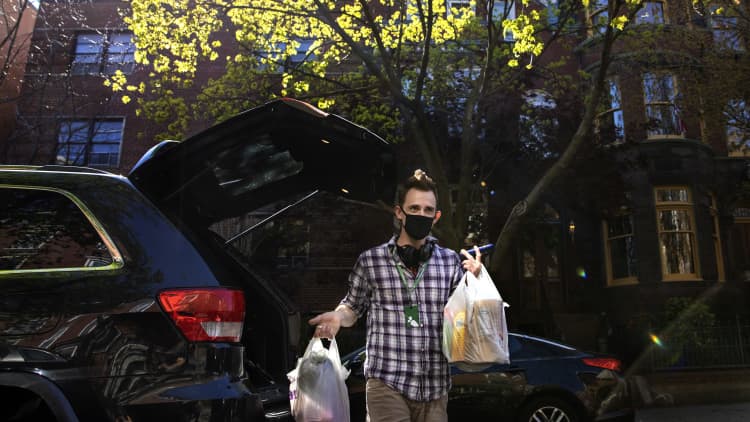
11:12 am: Small business rescue loan program hits $349 billion limit and is now out of money
The Small Business Administration's rescue loan program hit its $349 billion limit on Thursday and is now out of money as the nation's top Republicans and Democrats struggle to agree on how to restore its funds.
The Small Business Administration website reads that it is "unable to accept new applications for the Paycheck Protection Program based on available appropriations funding. Similarly, we are unable to enroll new PPP lenders at this time."
The announcement from the SBA on Thursday comes as scores of small American business owners work to deal with the fallout of the coronavirus and the move by some states to shutter the vast majority of commerce. —Thomas Franck, Kate Rogers
11:03 am: NYC mayor seeks federal aid as coronavirus costs New York $7.4 billion in lost tax revenue
The coronavirus pandemic will cost New York City a projected $7.4 billion in lost tax revenue over the current and next fiscal year after the city shuttered businesses and ordered people to stay indoors to try to contain the outbreak, Mayor Bill de Blasio said Thursday.
De Blasio urged Washington lawmakers to approve $500 billion in spending in the next stimulus bill with at least $150 billion of that going toward states, cities and local municipalities. That would help plug holes in budgets devastated by the government quarantines and help fund needed services, including police, fire and emergency response.
De Blasio said Congress should direct $100 billion to hospitals and health-care workers and $250 billion to small businesses and paycheck protection for workers, de Blasio said. —Noah Higgins-Dunn
10:50 am: PGA Tour plans to resume play June 8 with events closed to general public
The PGA Tour plans to resume play June 8 with the first four events closed to the general public, according to schedule adjustments announced Thursday.
The PGA Tour on March 12 said it canceled The Players Championship and all other events through the Valero Texas Open that ends on April 5.
The Charles Schwab Challenge, Rocket Mortgage Classic and the Memorial Tournament presented by Nationwide events that were previously scheduled between May 18 and June 8 have been moved to later dates in the calendar.
The RBC Heritage originally slated for April 13-19, but canceled on March 17, has been added back to the PGA Tour schedule in the week formerly occupied by the U.S. Open, which was postponed to September. —Melodie Warner
10:25 am: Facebook will start warning people who 'like' or react to fake coronavirus news
Facebook will start warning users if they have liked, reacted or commented on harmful Covid-19 posts that the company has found to be misinformation and removed.
The feature will roll out in the coming weeks, Facebook said in a blog post.
"These messages will connect people to COVID-19 myths debunked by the World Health Organization including ones we've removed from our platform for leading to imminent physical harm," Guy Rosen, Facebook's vice president of integrity, said in a blog post.
After the WHO declared Covid-19 a global health emergency in January, Facebook started removing misinformation about the outbreak from its platforms. The company said Thursday it's removed hundreds of thousands of pieces of misinformation that could lead to physical harm, such as inaccurate content that says physical distancing is ineffective or drinking bleach cures the virus. —Jessica Bursztynsky
9:49 am: The coronavirus pandemic isn't hurting US auto sales as much as feared, J.D. Power says
Sales of new vehicles to U.S. consumers declined less than expected at the beginning April despite the coronavirus outbreak and state orders keeping most dealer showrooms closed across the country, according to J.D. Power.
After U.S. auto plants closed and most states enacted "stay-at-home" directives last month, J.D. Power expected year-over-year sales to decline by as much as 80% this month compared with its prepandemic forecast. While still significantly down, sales through the first 12 days of April were only off by about 55% — indicating that sales for the full month might not be as bad as feared, the firm said Wednesday.
If that trend continues, it would mean sales of about 597,000 units in April compared with J.D. Power's prepandemic forecast of nearly 1.1 million vehicles for the month. —Michael Wayland
9:35 am: Stocks open slightly higher even after another dismal weekly jobs report
Stocks opened higher even as investors digested more data reflecting the economic devastation from the coronavirus pandemic. The Dow Jones Industrial Average traded 44 points higher, or 0.2%. The S&P 500 climbed 0.7% while the Nasdaq Composite advanced 1.1%.
Thursday's moves followed a slump during regular trading on Wednesday as gloomy economic data and anemic bank earnings fueled concerns over the coronavirus's impact on the U.S. economy. —Fred Imbert, Thomas Franck
9:18 am: The US economy will likely erase all the job gains since the financial crisis this week
The coronavirus and the forced closure of business throughout the U.S. have nearly wiped out the totality of job gains since the Great Recession.
The Labor Department reported Thursday that the number of Americans applying for state unemployment benefits totaled 5.245 million during the week ended April 11.
Combined with the government's prior three jobless claims reports, the number of Americans who have filed for unemployment over the previous four weeks is 22.025 million. That number is just below the 22.442 million jobs added to nonfarm payrolls since November 2009, when the U.S. economy first began to add jobs back to the economy after the recession. —Thomas Franck
9:11 am: Billionaire Barry Diller says bail out everyone and 'worry about paying the bills later'
Billionaire businessman Barry Diller told CNBC on Thursday the U.S. government should bail out all companies that have been hit hard by the coronavirus, including those in the travel industry.
"The damage that is being done every day is enormous," Diller said on "Squawk Box." "Everybody needs to be bailed out for this one time thing, and we'll worry about paying the bills later."
The comments from Diller, chairman of travel site Expedia and digital media group IAC, came after major U.S. airlines and the Treasury Department reached a deal that gives the carriers access to loans and grants to support payroll. In return, the government gets warrants that could become equity stakes.
Diller said Expedia is generating no revenue and will need to cut costs, including in advertising. —Jesse Pound
9:06 am: Starbucks is preparing to reopen cafes as local coronavirus conditions allow
Starbucks is preparing to reopen cafes as some U.S. states report that the number of new coronavirus cases has plateaued or even declined.
The coffee chain closed most of its U.S. and Canadian cafes on March 21, limiting service to delivery and drive-thru only. More than 60% of its U.S. cafes have a drive-thru lane. Starbucks initially said the closures would be for two weeks but later extended the measures until May 3. —Amelia Lucas
9:04 am: US home construction collapsed 22.3% in March
U.S. homebuilding activity collapsed in March as the coronavirus spread, with housing starts tumbling 22.3% from a month ago.
The Commerce Department said Thursday that groundbreakings occurred last month at a seasonally adjusted annual rate of 1.2 million units, down from a 1.56 million pace in February. Construction of single-family houses fell 17.5%, while apartment and condo starts were off 32.1% from a month ago.
The report showed a 6.1% decline in the completion of homes being constructed, which means many homes are being left half built. There was also a 6.8% drop in permits to begin construction. —Associated Press
8:56 am: Coronavirus crisis threatens to derail post-Brexit trade talks
The U.K. will most likely fail to strike a new trade agreement with the European Union by the end of the year, analysts have told CNBC, as the coronavirus crisis threatens to derail official trade talks.
Prime Minister Boris Johnson has pledged to conclude a post-Brexit trade deal this year. The U.K. is in a transition phase until December after leaving the bloc on Jan. 31. During the transition, it is working to establish trade arrangements with the 27-nation EU.
However, this timeline is now at risk after the two lead negotiators had to isolate due to Covid-19 infections. British and European negotiating teams held a call on Wednesday for the first time since both lead negotiators were forced to self-isolate. —Silvia Amaro
8:50 am: 'It may be in August' — Larry Fink says businesses reluctant to reboot without mass testing
BlackRock co-founder and CEO Larry Fink said the U.S. needs to increase its testing capacity for the coronavirus before its economy can restart in earnest.
"We're going to still see elements of the disease increasing in other parts of the world and until we have adequate testing, rapid testing, it's very hard to see how we're going to reboot in the next 30 days," Fink said on CNBC's "Squawk Box."
Fink expressed confidence that the U.S. will make progress on Covid-19 treatments, minimizing the severity of the disease. "Through that process, I do believe we'll be able to reboot. I do believe we're going to have a better, more normalized environment," he said.
"But it may not be in June or July. It may be in August," he said.
Fink, whose firm is the world's biggest asset manager, said businesses will be "very cautious" and "protective of their employees" as they consider when and how to relax work-from-home policies. —Kevin Stankiewicz
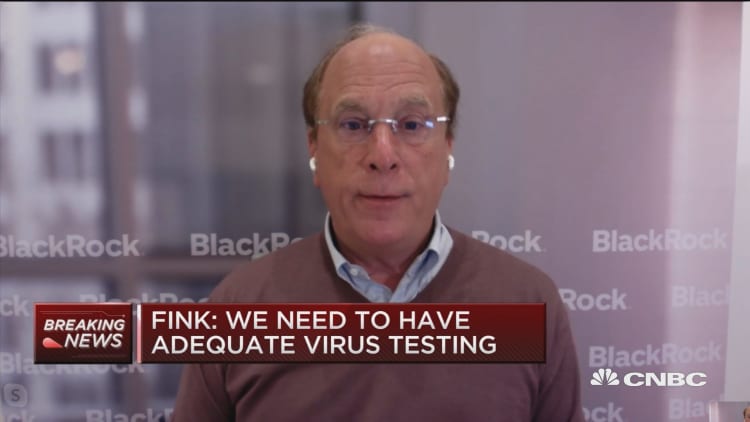
8:34 am: US weekly claims total 5.245 million, bringing total job losses due to coronavirus to 22 million
Protection measures against the coronavirus continued to tear through the employment ranks, with 5.245 million more Americans filing first-time claims for unemployment insurance last week, the Labor Department reported Thursday.
The new filings bring the crisis total to just over 22 million, nearly wiping out all the job gains since the Great Recession.
Though the most recent total, for the week ended April 11, represented a drop from the previous two weeks, it still showed that the damage to the U.S. labor market remains profound.
The numbers of late have been bolstered by measures taken to allow more workers to file claims. They now include independent contractors and others who previously were not eligible for benefits. —Jeff Cox
8:08 am: Jeff Bezos says widespread testing needed before economy can get running again
Amazon CEO Jeff Bezos said Thursday that mass testing around the world for the coronavirus is needed to "get the economy back up and running."
In his annual shareholder letter, Bezos also pointed to efforts Amazon has taken to protect its employees from the pandemic.
Bezos pointed to Amazon's efforts to develop "incremental testing capacity," which the company announced last week. As part of that announcement, Amazon said it hopes to begin testing all of its employees, including those who show no symptoms.
"Regular testing on a global scale, across all industries, would both help keep people safe and help get the economy back up and running," Bezos said. "For this to work, we as a society would need vastly more testing capacity than is currently available." —Annie Palmer
7:43 am: US hot spots span the East Coast
7:15 am: Trump to unveil reopening guidelines
President Donald Trump said he plans to release on Thursday national guidelines for reopening the economy.
"We'll be opening up some states much sooner than others," he said Wednesday. "We think some of the states can actually open up before the deadline of May 1."
The governors of seven states on the East Coast and three states on the West Coast have announced regional working groups to coordinate the reopening of the regions. With the exception of Massachusetts, all 10 states actively developing plans to reopen are led by Democratic governors. —Will Feuer
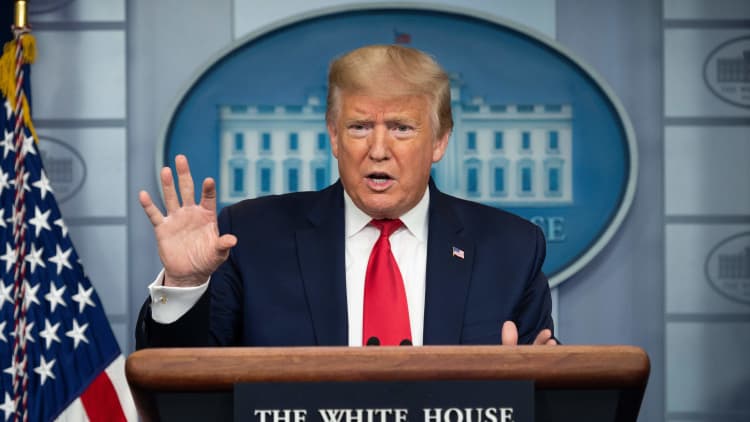
7:06 am: China races toward a vaccine
Three Chinese companies have vaccine candidates in clinical trials, CNBC's Eunice Yoon reports from Beijing. One company, Nasdaq-listed Sinovac, has already started enlisting volunteers to receive the first experimental doses. The company aims to complete safety and efficacy trials by June.
The Chinese government has allocated land for mass production of a successful vaccine candidate once it's ready, Yoon reports, and has expedited the approval process for human clinical trials. —Will Feuer
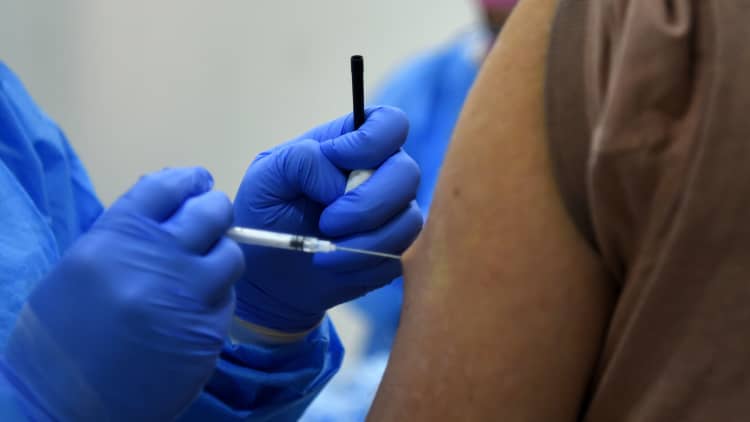
7:03 am: UK set to extend lockdown for three more weeks
Dominic Raab, who is deputizing for Prime Minister Boris Johnson while he is recovering from a serious case of Covid-19, is meeting government ministers Thursday, and is chairing a meeting of its emergency response committee.
It's widely expected that the country's lockdown will be extended for three weeks, amid stark warnings that the U.K. could end up being the worst hit country from the coronavirus in Europe.
The U.K.'s top medical expert said Wednesday that the country is probably seeing its peak of the virus (the death toll currently stands at 12,868 in British hospitals, with 761 daily deaths reported Wednesday), but it is too early to consider lifting lockdown measures that have been in place since March 23. — Holly Ellyatt
6:35 am: Spain's daily death toll rises slightly
The number of daily deaths in Spain has risen slightly, according to health ministry data.
In the past day, 551 people have died from the coronavirus, bringing the total death toll to 19,130. The daily death toll on Wednesday was 523.
The overall number of infections now stands at 182,816, the ministry said, 5,183 more cases than yesterday. —Holly Ellyatt
5:40 am: WHO says coming weeks are 'critical' as Europe's cases near 1 million
The World Health Organization's European regional director said that in the past 10 days, the number of confirmed cases in Europe has doubled to reach almost 1 million.
WHO's Hans Kluge told reporters in an online briefing that this meant about 50% of the global burden of Covid-19 was in Europe, where he said more than 84,000 have died from the virus.
"The storm clouds of this pandemic still hang heavily over the European region," Kluge said, according to Reuters. Commenting on the gradual lifting of restrictions on public life, Kluge said "there is no fast track back to normal." —Holly Ellyatt
4:30 am: Dutch study suggests 3% of population might have antibodies
A study of Dutch blood donors has found that around 3% have developed antibodies against Covid-19, health authorities said, Reuters reported. The findings give an indication of what percentage of the Dutch population may have already had the disease.
The head of the National Institute for Health disclosed the results during a debate with parliament.
"This study shows that about 3% of Dutch people have developed antibodies against the coronavirus," Jaap van Dissel said, the news agency reported. "You can calculate from that, it's several hundred thousand people," in a country of 17 million. —Holly Ellyatt
Read CNBC's coverage from CNBC's Asia-Pacific and Europe teams overnight here: WHO says coming weeks are 'critical' as Europe's cases near 1 million

